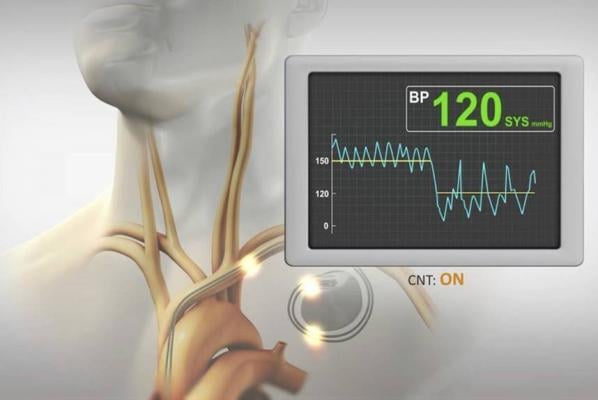
The BackBeat CNT system is a bioelectronic treatment that immediately, substantially and chronically lowers blood pressure (BP) while simultaneously modulating the autonomic nervous system (ANS).
October 10. 2019 — Late-breaking results from its MODERATO II double-blind, randomized study of BackBeat Cardiac Neuromodulation Therapy (CNT) demonstrated statistically significant and clinically meaningful reductions in systolic blood pressure in hypertensive patients also indicated for a pacemaker. The results were presented as late-breaking science at the Transcatheter Cardiovascular Therapeutics (TCT) 2019 annual conference.
Results showed the study met its primary efficacy endpoint, with patients randomized to BackBeat CNT experiencing an 11.1 mmHg (p<0.001) reduction in mean 24-hour ambulatory systolic blood pressure (ASBP) at six months follow-up, resulting in a significant difference of 8.1 mmHg compared to control patients who were managed only with antihypertensive medications (p=0.01). The study also met its primary safety endpoint with no statistical difference in rate of major cardiac adverse events (MACE) between the two groups at 6 months follow-up.
“Achieving a statistically significant blood pressure reduction with BackBeat CNT in this patient population is particularly exciting given that over 70% of pacemaker patients have high blood pressure as well as other known co-morbidities,” said Karl-Heinz Kuck, M.D., Ph.D., director of cardiology at the Lans Medicum, Hamburg, Germany and study principal investigator who presented the results at TCT. “This is a particularly challenging at-risk population with a very high rate of isolated systolic hypertension and persistently elevated blood pressure despite multi-drug therapy. BackBeat CNT appears to be a promising treatment to significantly reduce systolic blood pressure and has a favorable risk benefit profile as the device is already required for rhythm management.”
All patients enrolled in the MODERATO II study, a European prospective, multi-center, double-blind, randomized study of BackBeat CNT vs. control in 47 patients with persistent hypertension (ASBP ≥130 mmHg and office systolic blood pressure (OSBP) ≥ 140 mmHg) despite one or more anti-hypertensive medications and a pacemaker indication, were implanted with Orchestra BioMed’s Moderato® System, an implantable pulse generator that delivers BackBeat CNT as well as standard rhythm management functions that recently received CE mark approval. Following a 30-day run-in period during which patients received only standard pacing along with anti-hypertensive medications, patients who met follow-up screening criteria for daytime ASBP, were randomized to BackBeat CNT or control groups. Prior to randomization, mean ASBP for both groups were 136.3 mmHg with patients, on average, treated with over 3 prescribed anti-hypertensive drugs. After 6 months, mean ASBP was reduced by 11.1 mmHg (p<0.001) in the BackBeat CNT group as compared to a reduction of 3.1 mmHg in the control group (p=0.17). The treatment group saw a high (85%) overall response rate, with approximately 54% of the BackBeat CNT-treated patients experiencing ASBP reduction at 6 months of greater than 10 mmHg, an amount associated with a clinically meaningful reduction in risk of heart attack and stroke. The BackBeat CNT group also experienced significantly greater reduction, 12.4 mmHg, in OSBP over the control group (p=0.02). There were no MACE events in the BackBeat CNT group and 3 events in 2 patients in the control group. Additionally, there were no notable differences in echo parameters between the two arms. Diastolic blood pressure and heart rate did not change between groups during the study period.
“Achieving an 11.1 mmHg reduction in mean 24-hour ambulatory systolic blood pressure in the BackBeat CNT arm is a remarkable result, and clinically significant,” said David E. Kandzari, M.D., FACC, FSCAI, chief scientific officer and director, Interventional Cardiology, Piedmont Heart Institute, Atlanta, GA. “This data offers compelling preliminary evidence that this therapy may provide a safe and effective means to help the pacemaker population achieve target blood pressure levels and reduce cardiovascular risk.”
Over 1.1 million pacemakers are implanted annually worldwide. Patients indicated for a pacemaker have a particularly high rate of elevated blood pressure, with more than 70 percent of these patients suffering from hypertension. Based on 2017 American College of Cardiology/American Heart Association high blood pressure guidelines, it is estimated that over 60 percent of pacemaker patients have uncontrolled hypertension despite medical therapy.
BackBeat CNT is the flagship therapy of Orchestra BioMed Inc. It is a bioelectronic treatment that immediately, substantially and chronically lowers blood pressure (BP) while simultaneously modulating the autonomic nervous system (ANS). Orchestra BioMed’s CE mark-approved Moderato implantable pulse generator system delivers BackBeat CNT while also providing standard pacemaker functions. BackBeat CNT mimics the effects of multi-drug hypertension therapy by targeting preload, afterload and sympathetic tone. BackBeat CNT’s initial target are patients with uncontrolled hypertension who are also indicated for a pacemaker.


 January 05, 2026
January 05, 2026 









